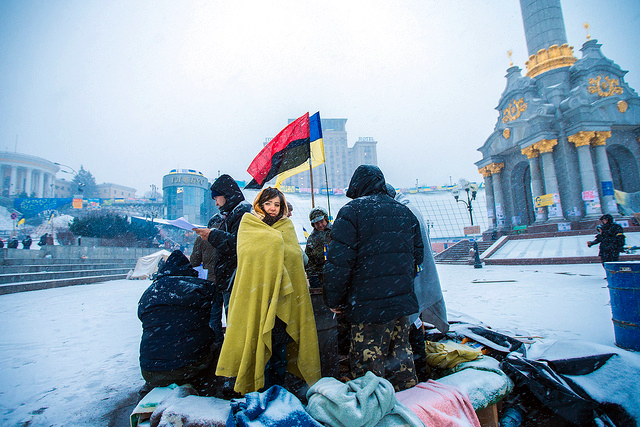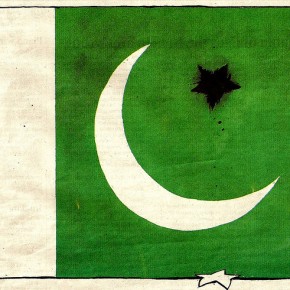Blame it on Pussy Riot. Thus far, the music has been a disappointment. The Ukraine, after all, is in decline. With no affluence to speak of, compared to Putin’s oil-rich Russia, culture, of the export variety, is nowhere to be found. You’d have to speak Ukrainian, (or Russian) to detect any national soundtrack, revolutionary, or otherwise, worth listening to.
Indeed, international news coverage of the turmoil engulfing the former Soviet state is bereft of any artistic moments.
At best, the unrest has its own aesthetic. Ukrainian security forces play the role of twentieth century fascists well, while demonstrators reprise roles familiar to those last seen in 1989, in the former Eastern Bloc. The coverage is so retro, it might as well be set in Berlin, before the fall of the wall. Or Bucharest, to be more precise, under the boot of Ceaucescu. The violence isn’t as severe, but the effect is uncomfortably similar.
To the Ukraine’s credit, music remains a helpful introduction to the present political crisis. For example, During the last period of upheaval, in 2004, the hip-hop band GreenJolly, put out a call to arms, in support of the Orange Revolution. “Razom Nas Bahato,” as the song is called, caught on like wildfire. It’s not the greatest rap ever written, but its enthusiasm is catchy, and it clearly expresses the spirit of its era.
If you have any familiarity with the track, its likely the English-language version, which was submitted to the Eurovision song contest, as the Ukraine’s entry, in 2005. Compressed to all high hell, the song’s original esprit de corps is clearly missing. Still, if you want to get a sense of what GreenJolly was originally going on about, this should do the trick.
Don’t blame yourself for being underwhelmed. There are far more challenging, and counter-cultural bands in the Ukraine, hip-hop, and otherwise. Perhaps the most apropos, at least concerning the present political situation, are The Ahineya, a recently disbanded crust-punk band, which, from the little English-language literature available about them, epitomize local disenchantment.
Gogol Bordello fans will likely not enjoy The Ahineya. There’s nothing especially worldbeat or collegiate about their hardcore. The preferred cultural references are 1980s British street punk bands like One Way System, not Ukrainian-Gypsy folk hybrids like Haydamaky, the blueprint for Eugene Hutz‘ hugely successful gypsy-punk act.
It’s a shame that The Ahineya are no more. In many ways, this is their moment. Still, if you know their discography, however cursorily, like Pussy Riot, there’s a feeling of authenticity to it, that helps explain the persistence of their idiom. Not every punk band has to get in the sort of trouble that Pussy Riot did, to effect change. Most of the time, it’s just enough to do what they do.
The same holds true for GreenJolly, who, while not exactly a revelation, point to the continued importance of hip-hop to oppositional politics. They may not be as memorable as their punk peers. Just use them as a gateway to better local bands. In all likelihood, you might end up discovering another artist, far more worthy.
Photograph courtesy of Sasha Maksymenko. Published under a Creative Commons license.





